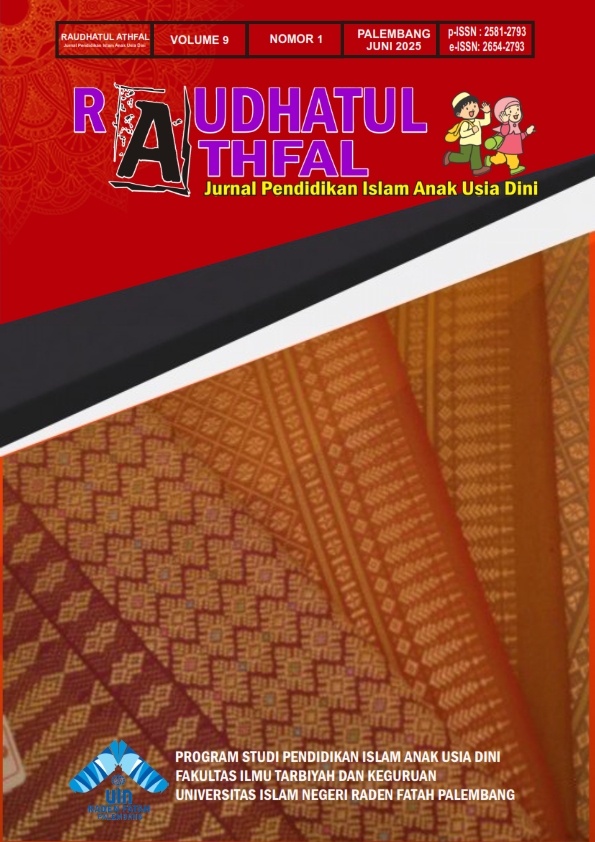The Impact of Busy Work on Parents' Role in Early Childhood Education
DOI:
https://doi.org/10.19109/ra.v9i1.27561Keywords:
Parents, occupational demands, early childhoodAbstract
This research aims to explore the extent to which work affects parents' contribution to children's development at home. Family life has undergone many changes, one of which is the increasing number of parents who both work, so their time to be involved in children's learning activities at home and at school is limited. This study involved three parents of young children (4-5 years old) in Central Island who work as farmers, traders and field labourers. They were purposively selected because they have busy jobs, making it relevant to uncover the influence of work on their role in children's education. Participants were willing to be interviewed and observed to explore their experiences of assisting children in the midst of their busy lives. This research used a qualitative approach with a case study method. Data collection techniques were interviews, observation and documentation, and data analysis was done descriptively and qualitatively. The results show that workload affects parents' participation in their children's education process. For example, farmers have limited time because they have to adjust to the season and weather, traders lose morning time due to trading, and field workers experience physical fatigue after work. This research is expected to provide an understanding of the impact of work activities on parental contributions and offer alternatives so that parents can make informed decisions about their children's education.
Downloads
References
Adolph, R. (2024). Peran Orang Tua Dalam Pendidikan Anak Usia Dini Di Tk Jia Lestari. Pelangi: Jurnal Pemikiran Dan Penelitian Pendidikan Islam Anak Usia Dini, 6(2), 1–23.
Agustina, S., Nurlaili, & Nirwana, E. S. (2022). Pengaruh Pekerjaan Orang Tua Terhadap Perkembangan Sosial Emosional Anak Usia 5-6 Tahun Di PAUD Islam Ummu Fathimah Kota Bengkulu. Journal Of Early Childhood Islamic Education, 5(2), 208–218.
Greenhaus, J. H., & Beutell, N. J. (1985). Sources of Conflict Between Work and Family Roles . Academy of Management Review, 10(1), 76–88.
https://doi.org/10.5465/amr.1985.4277352
Ormrod, J. E. (2008). Educational Psychology: Developing Learners (6th ed.). Pearson Merrill Prentice Hall.
Mead, G. H. (1934). Mind, Self, and Society. University of Chicago Press.
Allawiyah, K. (2022). Pengaruh kesibukan orang tua terhadap perkembangan sosial emosional anak usia dini. Jurnal Ilmiah Pendidikan Anak, 7(1), 1–10.
Bianchi, S. M. (2011). Family change and time allocation in American families. The Annals of the American Academy of Political and Social Science, 638(1), 21–44. https://doi.org/10.1177/0002716211413731
Fansen. (2020). Hubungan antara aktivitas kerja orang tua dan kemandirian anak usia dini di PAUD Yasporbi. Jurnal Pendidikan Anak, 5(2), 23–31.
Hartati, S. (2016). Pendekatan keluarga dalam pendidikan anak usia dini. Pustaka Pelajar.
Khairunnisa, A. (2022). Dampak pekerjaan orang tua terhadap emosi anak usia dini. Jurnal Ilmiah Anak Dan Pendidikan, 6(1), 17–28.
Latifah, I. (2021). Imbas keseimbangan kerja dan rumah tangga terhadap perkembangan anak. Jurnal Psikologi Dan Pendidikan Anak, 13(1), 25–33.
Maulida, H., & Fitriani, Y. (2020). Pengaruh perubahan sosial ekonomi terhadap pola pengasuhan anak. Jurnal Pendidikan Dan Pengasuhan Anak, 9(3), 78–85.
Musfiroh, T. (2011). Strategi pengembangan PAUD berbasis keluarga. Jurnal Pendidikan Anak Usia Dini, 3(1), 11–20.
Pratiwi, I. R. (2019). Sinergi rumah dan sekolah dalam pendidikan anak usia dini. Jurnal Pendidikan Anak, 8(2), 101–109.
Rahmawati, N. (2018). Peran orang tua dalam pendidikan karakter anak di era modern. Jurnal Ilmu Pendidikan, 20(2), 112–119.
Santrock, J. W. (2019). Perkembangan Sepanjang Rentang Kehidupan (17 (ed.)). Salemba Humanika.
UNICEF. (2017). Laporan Ringkasan: Menciptakan keseimbangan antara dunia kerja dan peran pengasuhan anak. UNICEF Indonesia. https://www.unicef.org/indonesia/id/laporan
Sjarkawi. (2008). Pembentukan kepribadian anak dalam lingkungan keluarga. Raja Grafindo Persada.
Setiawati, N. (2020). Komunikasi keluarga dalam membentuk karakter anak usia dini. Jurnal Ilmu Keluarga Dan Konsumen, 13(2), 92–101.
Suryana, D. (2017). Partisipasi orang tua dalam pendidikan anak usia prasekolah. Jurnal Pendidikan Anak, 6(1), 45–56.
Downloads
Published
Issue
Section
License
Copyright (c) 2025 Nur Fadila, Wulansari Vitaloka

This work is licensed under a Creative Commons Attribution-ShareAlike 4.0 International License.


.jpg)









.png)











